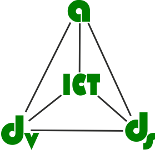Main research fields
The main research activity of AddICT lab covers the theoretical and practical aspects of computer and communication systems, including the modelling, design and analysis of network technologies, traffic and reliability modelling and optimization, software-driven networks, and the analysis of cloud computing systems, artificial intelligence supported telecommunication system management.
Research activity
The research activity of the lab is intensive both at the university and in the international comparison. The research results have been published on a regular basis for many years in high-quality international publications forums, prestigious conferences, high impact factor journals. Within the framework of research co-operation, foreign visiting researchers are regularly visiting us in Budapest and regularly invite the lab's staff to foreign universities to hold seminar lectures or lectures.
Thanks to the successful research activity, the laboratory is a regular winner of OTKA and European Union projects, bilateral research exchange programs. Currently the AddICT lab hosts the MTA (Hungarian Academy of Sciences) - BME Informatics Systems Research Group as well.
Apart from 14 successfully defended PHD dissertations, 8 PHD students take part in the research effort of the Laboratory.
The elaborated models, design and analysis methods were and are successfully applied in industrial projects since decades. Supported by our theoretical knowledge and practical experiences gained from the active research, our objective in education is to provide students with up-to-date and long lasting competences and skills in the aspects of network operation, network design, performance and reliability analysis.
Latest results
- We adapt the models used to design and analyse "traditional" communication networks to the modeling of software-based, programmable networks (SDN). Our current research area is modelling, analysing and designing multilayer hybrid SDN solutions that take into account the requirements of 5G networks.
- For the characterization and the stochastic modelling of network traffic, a number of Markov-based modelling tools are available to the lab, not just the mathematical formulas, but numerically stable, industry-proven, tried-and-tested implementations. Using these tools, you can create a traffic model that can then represent traffic in a simulation or analytic environment either from measurement data or based on some statistical features.
- In computing and telecommunication systems, queueing behavior often determines performance characteristics, queues are responsible for data transmission delays, saturating queues lead to data loss. The lab has state-of-the-art analysis algorithms for queueing systems and structured Markov chains. With our implementations, we can solve queues with multiple classes of correlated arrivals and service times.
- We have developed an efficient numerical inverse Laplace transformation procedure which eliminates many drawbacks (e.g., Gibbs oscillation, under and overshoot, ...) of existing methods.
Conferences, events
As organizer, the lab has brought a lot of prestigious international conferences to Budapest in the field of performance analysis in Hungary over the past 10 years.
- 2014: ASMTA (International Conference on Analytical & Stochastic Modelling Techniques & Applications)
- 2016: MAM (International Conference on Matrix-Analytic Methods in Stochastic Models)
- 2019 ITC31 (International Teletraffic Congress)
Additionally, the staff members of the lab have been continuously involved in the organization of further international conferences in various functions (program committee members, chair of the program committee, general organizer, reviewer, etc.)
Recent national and international projects
EIT-KIC project 2013-2014 (Smart Ubiquitous Content)
Network management for the provisioning of services provided by the Internet and ISPs can only be efficiently performed using advanced modeling and performance assessment methods. In the frame of this research project, the task of the lab was to extend known methods to analyse P2P traffic in the Internet and ISP environment.
TÁMOP FIRST project, 2012-2014 (Future Internet Research, Services and Technology)
In this project, the tasks performed by the lab were the study of stochastic modelling and queueing behavior of network traffic, the exploration of new communication paradigms and the theoretical and practical analysis of various communication strategies.
Research project in cooperation with Nokia - Bell Labs on anomaly detection
The goal of the project is to process the large amount of data collected by telecommunication equipments and to identify and predict sub-optimal (anomalous) periods. The project has been performed in cooperation with the Department of Stochastics of BME. The recent project phases are:
2018: Network State Transition Modelling and Prediction
2019: Predictive Network State Trajectory Modelling
2020-2021: Handling a mixture of data types for network state modeling
Research project in cooperation with Nokia - Bell Labs on virtualization
In today's communication networks the network resources can be flexibly configured for providing the best service to the clients. We had the following projects in this line research
2018. Resource Optimization of Edge Clouds,
2019: optimization of resource for 5G slices,
2020 resource optimization for end-to-end network slicing using RL
Ericsson Hungary R&D project, 2016-2018 (Multi timescale bandwidth profile and its application for burst-aware fairness)
The currently used resource allocation methods allocate service capacity according to the current bandwidth demand and do not take into account the past of the needs, which favors the needs that consume a large amount of resources continuously. We have proposed a resource sharing method and associated planning process that ensures equitable resource sharing based on the needs of the past.
OTKA national projects:
- 2006-2010: OTKA K61709 „Development of traffic modelling methods”
- 2012-2016: OTKA K101150 „Network-level traffic analysis of infocommunication systems”
- 2017-2021: OTKA K123914 “Erőforrás allokáció általános célú számítási architektúrákban”
Our international partners
The lab collaborates with many research associates abroad. List of institutions concerned (incomplete):
- TU Dortmund, Germany
- Universitá di Torino, Italy
- Universitá di Trento, Italy
- University of Antwerp, Belgium
- Freie Universitat, Berlin, Germany
- Imperial College, London, UK
- KTH, Sweden



